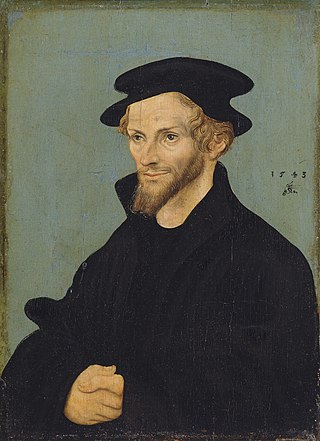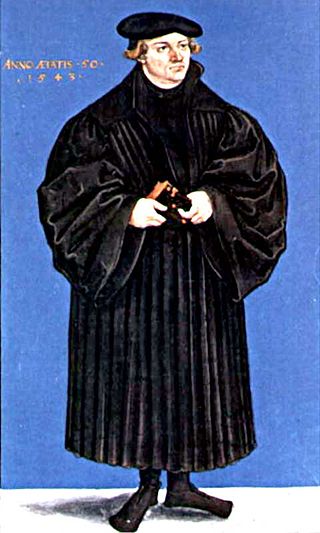Related Research Articles

Philip Melanchthon was a German Lutheran reformer, collaborator with Martin Luther, the first systematic theologian of the Protestant Reformation, an intellectual leader of the Lutheran Reformation, and influential designer of educational systems.

Joachim Camerarius, the Elder, was a German classical scholar. His critical abilities, his deep understanding of Greek and Latin, and his wide-ranging knowledge of the ancient world made him one of the foremost German scholars of his time.
Crypto-Calvinism is a pejorative term describing a segment of those members of the Lutheran Church in Germany who were accused of secretly subscribing to Calvinist doctrine of the Eucharist in the decades immediately after the death of Martin Luther in 1546. It denotes what was seen as a hidden Calvinist belief, i.e., the doctrines of John Calvin, by members of the Lutheran Church. The term crypto-Calvinist in Lutheranism was preceded by terms Zwinglian and Sacramentarian. Also, Jansenism has been accused of crypto-Calvinism by Roman Catholics.

The Book of Concord (1580) or Concordia is the historic doctrinal standard of the Lutheran Church, consisting of ten credal documents recognized as authoritative in Lutheranism since the 16th century. They are also known as the symbolical books of the Evangelical Lutheran Church.

The diets of Augsburg were the meetings of the Imperial Diet of the Holy Roman Empire held in the German city of Augsburg. Both an Imperial City and the residence of the Augsburg prince-bishops, the town had hosted the Estates in many such sessions since the 10th century. In 1282, the diet of Augsburg assigned the control of Austria to the House of Habsburg. In the 16th century, twelve of thirty-five imperial diets were held in Augsburg, a result of the close financial relationship between the Augsburg-based banking families such as the Fugger and the reigning Habsburg emperors, particularly Maximilian I and his grandson Charles V. Nevertheless, the meetings of 1518, 1530, 1547/48 and 1555, during the Reformation and the ensuing religious war between the Catholic emperor and the Protestant Schmalkaldic League, are especially noteworthy. With the Peace of Augsburg, the cuius regio, eius religio principle let each prince decide the religion of his subjects and inhabitants who chose not to conform could leave.
Adiaphoron is the negation of διαφορά diaphora, "difference".

The German word Schwabacher refers to a specific style of blackletter typefaces which evolved from Gothic Textualis (Textura) under the influence of Humanist type design in Italy during the 15th century. Schwabacher typesetting was the most common typeface in Germany, until it was replaced by Fraktur from the mid 16th century onwards. In the course of the 18th and 19th centuries, Fraktur gave way in turn to Antiqua.
Apology, The Apology, apologize/apologise, apologist, apologetics, or apologetic may refer to:

Justus Jonas, the Elder, or simply Justus Jonas, was a German Lutheran theologian and reformer. He was a Jurist, Professor and Hymn writer. He is best known for his translations of the writings of Martin Luther and Philipp Melanchthon. He accompanied Martin Luther in his final moments.
The Apology of the Augsburg Confession was written by Philipp Melanchthon during and after the 1530 Diet of Augsburg as a response to the Pontifical Confutation of the Augsburg Confession, Charles V's commissioned official Roman Catholic response to the Lutheran Augsburg Confession of 25 June 1530. It was intended to be a defense of the Augsburg Confession and a refutation of the Confutation. It was signed as a confession of faith by leading Lutheran magnates and clergy at the meeting of the Smalkaldic League in February, 1537, and subsequently included in the German [1580] and Latin [1584] Book of Concord. As the longest document in the Book of Concord it offers the most detailed Lutheran response to the Roman Catholicism of that day as well as an extensive Lutheran exposition of the doctrine of Justification.
The Smalcald Articles or Schmalkald Articles are a summary of Lutheran doctrine, written by Martin Luther in 1537 for a meeting of the Schmalkaldic League in preparation for an intended ecumenical Council of the Church.
The Treatise on the Power and Primacy of the Pope (1537), The Tractate for short, is the seventh Lutheran credal document of the Book of Concord. Philip Melanchthon, its author, completed it on 17 February 1537 during the assembly of princes and theologians in Smalcald.
The Ubiquitarians, also called Ubiquists, were a Protestant sect that held that the body of Christ was everywhere, including the Eucharist. The sect was started at the Lutheran synod of Stuttgart, 19 December 1559, by Johannes Brenz (1499–1570), a Swabian. Its profession, made under the name of Duke Christopher of Württemberg and entitled the "Württemberg Confession," was sent to the Council of Trent in 1552, but had not been formally accepted as the Ubiquitarian creed until the synod at Stuttgart.
Lutheranism as a religious movement originated in the early 16th century Holy Roman Empire as an attempt to reform the Catholic Church. The movement originated with the call for a public debate regarding several issues within the Catholic Church by Martin Luther, then a professor of Bible at the young University of Wittenberg. Lutheranism soon became a wider religious and political movement within the Holy Roman Empire owing to support from key electors and the widespread adoption of the printing press. This movement soon spread throughout northern Europe and became the driving force behind the wider Protestant Reformation. Today, Lutheranism has spread from Europe to all six populated continents.
The Tetrapolitan Confession, also called the Strasbourg Confession or Swabian Confession, was an early Protestant confession of faith drawn up by Martin Bucer and Wolfgang Capito and presented to the Emperor Charles V at the Diet of Augsburg on 9 July 1530 on behalf of the four south German cities of Konstanz, Lindau, Memmingen and Strasbourg. The confession was based on an early draft of the Augsburg Confession to which Bucer and Capito had secretly obtained access, but amended in the direction of Zwinglianism. Its purpose was to prevent a schism within Protestantism. It is the oldest confession of the Reformed tradition produced in Germany.
The Philippists formed a party in early Lutheranism. Their opponents were called Gnesio-Lutherans.
The Altered Augsburg Confession is a later version of the Lutheran Augsburg Confession that includes notable differences with regard to holy communion and the presence of Christ in bread and wine. It is distinguished from the unaltered or Editio princeps.
The Augsburg Confession, also known as the Augustan Confession or the Augustana from its Latin name, Confessio Augustana, is the primary confession of faith of the Lutheran Church and one of the most important documents of the Protestant Reformation. The Augsburg Confession was written in both German and Latin and was presented by a number of German rulers and free-cities at the Diet of Augsburg on 25 June 1530.

Lazarus Spengler was a prominent supporter of Martin Luther and leader of the Protestant Reformation in Nuremberg, as well as a famous hymnwriter.

The Confutatio Augustana was the Catholic refutation of the Augsburg Confession, often referred to in the theological literature as simply the Confutatio.
References
- 1 2 Johann Michael Reu, The Augsburg Confession (1930), p. 28.
- ↑ "Articles of Schwabach | Definition & Facts". Encyclopedia Britannica. Retrieved 18 March 2021.